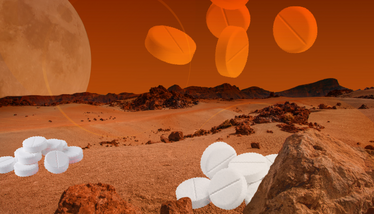The Martian Pharmacy
The transportation, storage, and administration of drugs in space: a hypothesis and the case for lyophilization
| 4 min read | Interview

Collage images supplied from AdobeStock.com
Between January 8, 1994 and March 22, 1995, cosmonaut Valeri Polyakov spent 437 days in space – clinching a world record for the longest off-world mission by a single human (a record that remains to this day) and setting a precedent for the future of record breaking space farers. With talk of space tourism gathering interest – and likelihood – there will come a time when space exploration moves away from the realms of scientific research and into an environment in which people can live and work for extended periods of time.
But where there are people, there will be illnesses that require treatments. How do we get medicines into space and, once there, how do we store and maintain them until they’re required?
In a recent commentary article, Munich-based Coriolis Pharma CTO Tim Menzen discusses a possible solution: “Lyophilization is a promising approach to reduce weight during transportation and achieve storage stability at room temperature without cold-chain demands.” We spoke with Menzen to find out what the transport, storage, distribution, and administration of drugs in space could look like.
Surely astronauts ought to be in peak physical health. Why are pharmaceuticals necessary for spacefaring generations?
Pharmaceuticals can serve different purposes, from prevention to treatment of diseases. We may require specific pharmaceuticals to minimize or alleviate the impact of the strong radiation in space or to treat diseases caused by radiation that we don’t see on Earth. In the nearer-term, it will be a matter of using pre-existing medications in space. The duration of time spent in space that will affect what type of pharmaceuticals would be needed to maintain health and cure acute diseases. Insulin and alteplase for chronic diabetes and acute ischemic stroke, respectively, are two specific reasons why biopharmaceutical drugs will be necessary in space.
What are the challenges and potential solutions of long-term transport and storage of (bio)pharmaceuticals in space?
Proteins in solution are particularly sensitive to mechanical stress. Stress caused during lift off and transit into space may lead the biopharmaceutical drug to aggregate at air-liquid interfaces, on container surfaces, or from cavitation when liquid is subject to high mechanical forces. Although surfactants can potentially mitigate these problems, the behavior of protein, formulation, and packaging material is difficult to predict. We have well-defined studies in place to test the impact of transportation on drug products during development.
Lyophilized proteins are much more resistant to mechanical stress, which could make them useful for transportation into space. However, we would need to study and demonstrate both protein stability and the integrity of the lyo cake – and mimic the stress profile during rocket transportation at small scale in the labs.
Lyophilization can also avoid the need for a robust cold chain. Proteins in solution are typically stored under refrigerated conditions (2–8 °C). Frozen storage (below -20 °C) can be a challenge in supply chains on Earth, so imagine the challenges in space where you would have limited energy and cold storage capacity. In contrast, lyophilized drug products are better protected against accidental freezing and can often be stored at room temperature for months or even years.
Container closure integrity under deep-frozen conditions is a challenge, but it could be interesting to think about storing biopharmaceuticals at ultra-low temperatures in the vacuum of space for really long-term storage; indeed, that may be required during deep space missions or for colonies on the moon or even Mars.
What's stopping us from manufacturing biopharmaceuticals in space?
A missing need! But also the lack of practicability. There is a huge interest in space biotechnology for the production of oxygen, water, and food, and I imagine that therapeutic proteins could be expressed in space; however, a drug product is more than an expressed protein. The whole process chain from upstream to downstream processing would need to be transferred into space. Not to mention all the analytics. You would need to operate almost an entire pharmaceutical enterprise in space.
Humans need many orders of magnitude more oxygen, water, and food than they need medicines so this has to be the priority. I think medicines and other high-end products will probably be stocked at launch or supplied in the case of space exploration missions and temporary colonies, unless we achieve a self-sustaining extraterrestrial civilization.
How could the increasing knowledge around novel modalities and therapeutic concepts influence the development of drugs in space?
Indeed! Do we really need to manufacture therapeutic proteins in space? Rather than manufacturing protein drugs in space, we may be able to deliver mRNA to a patient’s target cells in vivo, which will then express the desired protein drug where it is needed. Immunotherapy with monoclonal antibodies produced in vivo is a possibility. In such a case, mRNA and a simple delivery vehicle could be synthesized in space from a few raw materials and may be much more practicable compared with manufacturing protein drugs. Lyophilization could still remain a key technology for long-term storage of these mRNA drugs. Studies on lyophilization in space have been performed aboard the ISS.
Where does research into space-based biopharmaceuticals go from here?
One can only hypothesize at this point; the real research – the really exciting part – still needs to be done. And that will require funding and collaboration, so I am open to the ideas and hypotheses of like-minded people! How we achieve this is perhaps more pertinent than the where and the when. To me, the opening of the first public Martian pharmacy is the ultimate sign that humans have become a truly multiplanetary species. It would be my pleasure to have a chat with this Martian colleague. I think it is unlikely to happen in my lifetime, but we can wait and see what the future holds.



















